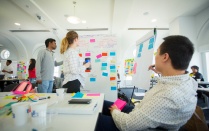Ensuring Refugee Health and Wellbeing

Buffalo String Works performance at the Annual WNY Refugee Health Summit
Though people have migrated for centuries, current local and global crises have triggered forced movement on a scale not witnessed since World War II (Lemke, 2017). The influx of refugees to host nations has generated nationalist supremacy discourses and polarized cultural debates that both “welcome” and “reject” newcomers, including within the United States. This demands that researchers and practitioners concerned with increasing equity for refugees and other displaced persons, to push disciplinary boundaries, as well as existent policy and practices in ways that responsibly challenge those conditions that permit forced movement to continue. To do so, the Refugee Health and Well-Being Big Ideas Team cultivates co-constructed research-policy-practice partnerships at local, national, and international levels with the aim of supporting and growing equitable resettlement processes for displaced children, adults, and families.
Refugee Health and Well-being: Cultivating Co-Constructed and Equity-based Research, Policy, and Practice Partnerships
By Melinda Lemke and Kafuli Agbemenu
According to the United Nations High Commissioner for Refugees (UNHCR, 2021), in 2020 82.4 million people were forcibly displaced worldwide due to conflict and war, human rights violations, persecution, violence and/or events such as climate change that disturb the public order. This number more than doubled from ten years ago, and includes 48 million internally displaced persons (IDP), 26.4 million refugees, and 4.1 million asylum seekers. Importantly, 35 million displaced persons are children and one million children were born as refugees. Finally, almost three-quarters of all displaced persons originate from five countries – Afghanistan, Myanmar, South Sudan, Syrian Arab Republic, and Venezuela, and 39% are hosted by Columbia, Germany, Pakistan, Turkey, and Uganda.
These numbers are staggering, and are tied to the structural legacy of colonialism and the social, economic, and political conditions of a neoliberal present. When considering the human experience of forcible movement, pre-movement experiences and resettlement processes are fraught with challenges for adults, and the increased likelihood of exploitation, abuse, and rights violations for children and youth. In the United States, refugees who transition to existent systems face a range of social and public health inequities including, but not limited to normatively held biases about refugees and discourses of fear that negatively affect community perspectives about displaced persons, as well as system-based language, cultural, and educational barriers. Furthermore, U.S. systems and practitioners struggle to balance an asset-based stance toward displaced persons, which is mindful of the rich history, traditions, and talents brought to the host nation, with that of the social, emotional, mental, and physical traumas carried by refugees.
Forcible displacement is not a uniform experience and refugees comprise a heterogenous, non-monolithic group. Though spatialized displacement typically is thought of as patterns involving movement from the Global South to the Global North, thereby implicating northern nation-states and private capital in these processes, we also acknowledge that Global South is indicative of additional contexts, including those within the U.S. that lack financial and infrastructural resources, have heightened rates of racialized violence, and endure other spatialized forms of inequality. At a basic human rights level, providing access to food, water, safety, and shelter is critical to the welfare of refugees and other spatially displaced persons. Additionally, it is essential that resettlement processes involving education, healthcare, housing, legal systems, and work placement are grounded in asset-based, culturally and linguistically responsive, and trauma-informed practices that aim to improve overall health, flourishing, and well-being.
To support this vision, the Community for Health in Global Health Equity Big Ideas Team on Refugee Health and Well-being brings together scholarly and practitioner expertise from architecture, education, the humanities, law, medicine, nursing, pediatrics, public health, social work, urban planning and other disciplines. To support the needs of those resettled in Western New York, and the Buffalo community in particular, through public engagement and university events, we are intentional in our aim to join activists, clinicians, community partners, refugees, and scholars who want to engage in the ethical, co-production of knowledge and resources critical to fostering refugee health and well-being.
References
Lemke, M. (2017). Trafficking and immigration policy: Intersections, inconsistencies, and implications for public education. Educational Policy, 31(6), 743-763. https://doi.org/10.1177/0895904817719528
United Nations High Commissioner for Refugees. (2021). Refugee data finder. https://www.unhcr.org/refugee-statistics/

Our Working Solutions

Lin Research Group
In the News
Policy Briefs
Articles and Reflections
Our Team
Hertel Elmwood Internal Medicine Center 900 Hertel Ave. Buffalo, NY 14216
Phone: 716-871-1571
Email: rod2@buffalo.edu

Joseph Gambacorta
Assistant Dean, Clinical Affairs
School of Dental Medicine
Professor; Director of Undergraduate Studies, Environmental Engineering
Department of Civil, Structural and Environmental Engineering
Founding Co-lead, Community for Global Health Equity; Professor
Department of Industrial and Systems Engineering
Associate Professor and Director of Graduate Studies
Department of Community Health and Health Behavior
Co-Director and Founding Co-Lead, Community for Global Health Equity; Co-Lead, Food Equity Team; Project Lead, Plan REFUGE; Professor
Urban and Regional Planning
Founding Co-Lead, Community for Global Health Equity; Professor and Chair
Department of Architecture
Phone: 716-575-2874
Email: khsmith@buffalo.edu

Biplab Bhattacharya, PhD
UB Alumnus; Former Graduate Assistant
Industrial and Systems Engineering and Community for Global Health Equity
Email: biplabsu@buffalo.edu
Sadi Dhakhwa
UB Alumna
M. Architecture
Email: sadichch@buffalo.edu
Ryan Frederiks
UB Alumna
MS. Geology
Email: rsfreder@buffalo.edu

Nicole Little
UB Alumna; Former Graduate Assistant
MArch, MUP

Danielle Vasquez
Graduate Student
Management and Public Health and Health Professions
Our work is done in collaboration with many talented community partners. We list these partners on the affiliated project pages.




























